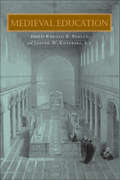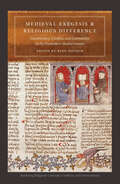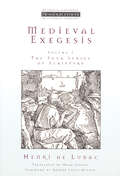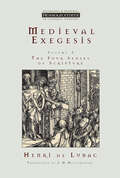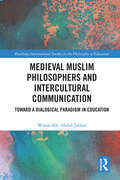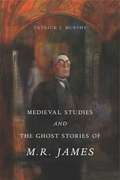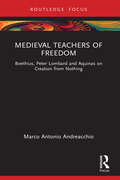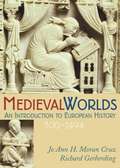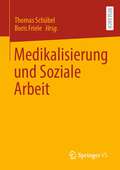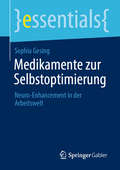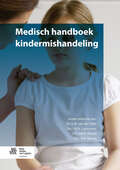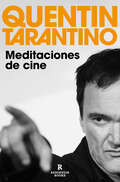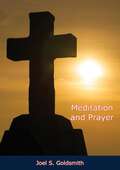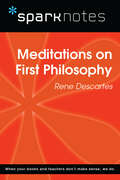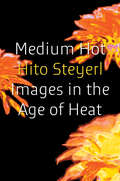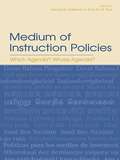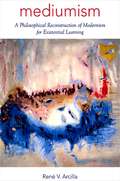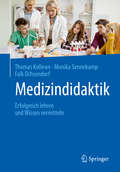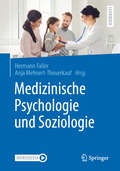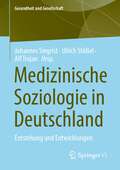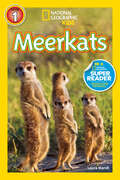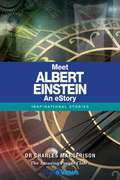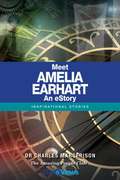- Table View
- List View
Medieval Education (Fordham Series in Medieval Studies)
by Ronald B. Begley Joseph W. Koterski, S.J.This volume offers original studies on the subject of medieval education, not only in the formal academicsense typical of schools and universities but also in a broader cultural sense that includes law, liturgy, and the new religious orders of the high Middle Ages. Its essays explore the transmission of knowledge during the middle ages in various kinds of educational communities, including schools, scriptoria, universities, and workshops.
Medieval Exegesis and Religious Difference: Commentary, Conflict, and Community in the Premodern Mediterranean (Bordering Religions: Concepts, Conflicts, and Conversations)
by Ryan SzpiechJews, Christians, and Muslims all have a common belief in the sanctity of a core holy scripture, and commentary on scripture (exegesis) was at the heart of all three traditions in the Middle Ages. At the same time, because it dealt with issues such as the nature of the canon, the limits of acceptable interpretation, and the meaning of salvation history from the perspective of faith, exegesis was elaborated in the Middle Ages along the faultlines of interconfessional disputation and polemical conflict. This collection of thirteen essays by world-renowned scholars of Judaism, Christianity, and Islam explores the nature of exegesis during the High and especially the Late Middle Ages as a discourse of cross-cultural and interreligious conflict, paying particular attention to the commentaries of scholars in the western and southern Mediterranean from Iberia and Italy to Morocco and Egypt.Unlike other comparative studies of religion, this collection is not a chronological history or an encyclopedic guide. Instead, it presents essays in four conceptual clusters (“Writing on the Borders of Islam,” “Jewish-Christian Conflict,” “The Intellectual Activity of the Dominican Order,” and “Gender”) that explore medieval exegesis as a vehicle for the expression of communal or religious identity, one that reflects shared or competing notions of sacred history and sacred text. This timely book will appeal to scholars and lay readers alike and will be essential reading for students of comparative religion, historians charting the history of religious conflict in the medieval Mediterranean, and all those interested in the intersection of Jewish,Christian, and Muslim beliefs and practices.
Medieval Exegesis, Vol. 1: The Four Senses of Scripture (Ressourcement: Retrieval and Renewal in Catholic Thought (RRRCT))
by Henri de LubacOriginally published in French as Exégèse médiévale, Henri de Lubac's multivolume study of medieval exegesis and theology has remained one of the most significant works of modern biblical studies. Available now for the first time in English, this long-sought-after volume is an essential addition to the library of those whose study leads them into the difficult field of biblical interpretation. The first volume in de Lubac's multivolume work begins his comprehensive historical and literary study of the way Scripture was interpreted by the church of the Latin Middle Ages. Examining the prominent commentators of the Middle Ages and their texts, de Lubac discusses the medieval approach to biblical interpretation that sought "the four senses" of Scripture, especially the dominant practice of attempting to uncover Scripture's allegorical meaning. Though Bible interpreters from the Enlightenment era on have criticized such allegorizing as part of the "naivete of the Middle Ages," de Lubac insists that a full understanding of this ancient Christian exegesis provides important insights for us today.
Medieval Exegesis, vol. 3: The Four Senses of Scripture (Ressourcement: Retrieval and Renewal in Catholic Thought (RRRCT))
by Henri de LubacFor many years biblical scholars were convinced that the Middle Ages was marked by a so-called pre-critical understanding of the Bible, with only a handful of isolated exceptions -- like Andrew of St. Victor -- popping up as precursors of the historical-critical method. Here, however, Henri de Lubac draws on extensive documentation to demonstrate that even among the Victorines traditional exegesis involving an interplay between the literal and spiritual senses of Scripture is a constant throughout medieval exegesis. The one exception -- a radically important one, de Lubac readily admits -- was Joachim of Flora, whose doctrine is considered in the final chapter of this volume.This third English volume of de Lubac's monumental Medieval Exegesis covers volume 2, part 1 of his French volume and includes both the original Latin notes and an English version of the sources.
Medieval History of India - Competitive Exam
by Indic TrustThis is a compilation of questions answer of Medieval History of India For Civil Services Competitive Examinations.
Medieval Muslim Philosophers and Intercultural Communication: Towards a Dialogical Paradigm in Education (Routledge International Studies in the Philosophy of Education)
by Wisam Kh. Abdul-JabbarThis book examines the works of Medieval Muslim philosophers interested in intercultural encounters and how receptive Islam is to foreign thought, to serve as a dialogical model, grounded in intercultural communications, for Islamic and Arabic education. The philosophers studied in this project were instructors, tutors, or teachers, such as Al-Kindi, Al-Farabi, Al-Ghazali, and Averroes, whose philosophical contributions directly or indirectly advanced intercultural learning. The book describes and provides examples of how each of these philosophers engaged with intercultural encounters, and asks how their philosophies can contribute to infusing intercultural ethics and practices into curriculum theorizing. First, it explores selected works of medieval Muslim philosophers from an intercultural perspective to formulate a dialogical paradigm that informs and enriches Muslim education. Second, it frames intercultural education as a catalyst to guide Muslim communities’ interactions and identity construction, encouraging flexibility, tolerance, deliberation, and plurality. Third, it bridges the gap between medieval tradition and modern thought by promoting interdisciplinary connections and redrawing intercultural boundaries outside disciplinary limits. This study demonstrates that the dialogical domain that guides intercultural contact becomes a curriculum-oriented structure with Al-Kindi, a tripartite pedagogical model with Al-Fārābī, a sojourner experience with Al-Ghazali, and a deliberative pedagogy of alternatives with Averroes. Therefore, the book speaks to readers interested in the potential of dialogue in education, intercultural communication, and Islamic thought research. Crucially bridging the gap between medieval tradition and modern thought by promoting interdisciplinary connections and redrawing intercultural boundaries outside disciplinary limits, it will speak to readers interested in the dialogue between education, intercultural communication, and Islamic thought. .
Medieval Studies and the Ghost Stories of M. R. James
by Patrick J. MurphyMontague Rhodes James authored some of the most highly regarded ghost stories of all time—classics such as “Oh, Whistle, and I’ll Come to You, My Lad” that have been adapted many times over for radio and television and have never gone out of print. But while James is best known as a fiction writer and storyteller, he was also a provost of King’s College, Cambridge, and Eton College, and a legendary and influential scholar whose pioneering work in the study of biblical texts and medieval manuscripts, art, and architecture is still relevant today.In Medieval Studies and the Ghost Stories of M. R. James, Patrick J. Murphy argues that these twin careers are inextricably linked. James’s research not only informed his fiction but also reflected his anxieties about the nature of academic life and explored the delicate divide between professional, university men and erratic hobbyists or antiquaries. Murphy shows how detailed attention to the scholarly inspirations behind James’s fiction provides considerable insight into a formative moment in medieval studies, as well as into James’s methods as a master stylist of understated horror.During his life, James often claimed that his stories were mere entertainments—pleasing distractions from a life largely defined by academic discipline and restraint—and readers over the years have been content to take him at his word. This intriguing volume, however, convincingly proves otherwise.
Medieval Studies and the Ghost Stories of M. R. James (G - Reference, Information and Interdisciplinary Subjects)
by Patrick J. MurphyMontague Rhodes James authored some of the most highly regarded ghost stories of all time—classics such as “Oh, Whistle, and I’ll Come to You, My Lad” that have been adapted many times over for radio and television and have never gone out of print. But while James is best known as a fiction writer and storyteller, he was also a provost of King’s College, Cambridge, and Eton College, and a legendary and influential scholar whose pioneering work in the study of biblical texts and medieval manuscripts, art, and architecture is still relevant today.In Medieval Studies and the Ghost Stories of M. R. James, Patrick J. Murphy argues that these twin careers are inextricably linked. James’s research not only informed his fiction but also reflected his anxieties about the nature of academic life and explored the delicate divide between professional, university men and erratic hobbyists or antiquaries. Murphy shows how detailed attention to the scholarly inspirations behind James’s fiction provides considerable insight into a formative moment in medieval studies, as well as into James’s methods as a master stylist of understated horror.During his life, James often claimed that his stories were mere entertainments—pleasing distractions from a life largely defined by academic discipline and restraint—and readers over the years have been content to take him at his word. This intriguing volume, however, convincingly proves otherwise.
Medieval Teachers of Freedom: Boethius, Peter Lombard and Aquinas on Creation from Nothing (Anglo-Italian Renaissance Studies)
by Marco Antonio AndreacchioMedieval debates over "divine creation" are systematically obscured in our age by the conflict between "Intelligent Design" Creationists and Evolutionists. The present investigation cuts through the web of contemporary conflicts to examine problems seated at the heart of medieval talk about creation. From three representative authors we learn that the doctrine of divine creation is supposed to invite understanding of the relation between artistic freedom and natural necessity, of the very essence of causality, and thereby of the nexus between experience (our world of empirical determinations) and reality (the absolute indetermination of eternal being). Most importantly, medieval scholarship shows us that the problems it addresses are originally inherent in the understanding itself, whereby the question of being emerges as inseparable from the question of interpretation.
Medieval Worlds: An Introduction To European History, 300-1492
by Richard Gerberding Jo Ann Hoeppner Moran CruzThis text is for undergraduate university and college students. The authors endeavored to present an expansive view of medieval society and a fluid view of the changes medieval society underwent from late antiquity into the Italian Renaissance. The text would integrate cultural and literary developments, intellectual contributions, literacy and education, the role of women, popular religious impulses, and papal perspectives, as well as the political history of kings and queens, emperors, counts, and communes. The authors have chosen not to directly discuss theoretical or methodological approaches to gender, race, class, post-colonialism or post-modernism. Rather, they have folded a sensitivity to these approaches into the narrative itself and into a rather inclusive treatment of topics. Women have been incorporated into the narrative at every level. Social groupings, ethnic identities, slavery, the interactions of Europeans with non-Europeans, as well as the conditions for minorities and for new groups entering Europe all find their appropriate place in the account. The authors have given a good deal of attention to Islam, both as a subject in itself and as an important influence on medieval Europe.
Medikalisierung und Soziale Arbeit
by Thomas Schübel Boris FrieleDer Sammelband beleuchtet Medikalisierungsprozesse speziell mit Blick auf deren Relevanz für die Soziale Arbeit. Als Medikalisierung wird die kritisch zu hinterfragende Umdeutung lebensweltlicher Problemlagen und sozialer Konflikte in medizinisch relevante Störungen verstanden. Die Beiträge beleuchten theoretisch oder empiriebezogen, in welcher Weise die Soziale Arbeit als Profession und Disziplin mit Medikalisierungsprozessen konfrontiert ist und wie sie diesen theoretisch und handlungsbezogen begegnen kann.
Medikamente zur Selbstoptimierung: Neuro-Enhancement in der Arbeitswelt (essentials)
by Sophia GesingDieses essential stellt umfassend die aktuellen Erkenntnisse zu Neuro-Enhancement dar. Dieser Begriff beschreibt ein Phänomen der heutigen Arbeitswelt, bei dem Medikamente gezielt zur Selbstoptimierung eingenommen werden. Es werden Bedeutung und Verbreitung von Neuro-Enhancement erörtert, Erklärungsansätze zu den Motiven hinter der Einnahme gegeben sowie die konsumierten Substanzarten näher erläutert. Zudem werden die Wirksamkeit und die Risiken fundiert dargelegt. Eine moralische Bewertungsdiskussion sowie Handlungsempfehlungen und Alternativen zur Einnahme verschreibungspflichtiger Medikamente zur Leistungs- und Wohlbefindenssteigerung runden dieses essential ab.
Medisch handboek kindermishandeling
by A. H. Teeuw E.M. van de Putte I.M.A. Lukkassen I.M.B. Russelhandboek voor brede doelgroep: kinderartsen, jeugdartsen, SEH-artsen en huisartsen over het signaleren en herkennen van kindermishandeling. De opbouw van ieder hoofdstuk zal als volgt zijn: terminologie, epidemiologie, diagnose, behandeling, casus.
Meditaciones de cine
by Quentin TarantinoLlega el esperado y ansiado primer libro de no ficción de Quentin Tarantino. Su libro más personal: un viaje íntimo por sus películas favoritas, relatado con una voz inconfundible. Probablemente, Quentin Tarantino sea uno de los mayores cineastas de la historia, pero de lo que no hay atisbo de duda es de que estamos hablando del espectador que mejor puede contagiar su pasión entusiasta por las películas que ha visto. Ahora, por fin llega el libro con el que tantos años soñaron él y sus seguidores. En Meditaciones de cine, Tarantino analiza desde los puntos de vista más insólitos y con su particular conocimiento enciclopédico varias películas clave del cine norteamericano de los setenta, todas ellas vistas en su más tierna infancia (de las más violentas a las más tórridas), así como revisitadas compulsivamente. El resultado es una obra tan rigurosa y reflexiva como juguetona y entretenida. Meditaciones de cine es, a la vez, crítica cinematográfica, teoría del cine, reportaje literario y unas memorias formidables, a la altura de clásicos del género como los de Hitchcock y Truffaut o Luis Buñuel. La crítica ha dicho...«Lo que une todos los hilos y temas de este libro es una rotunda verdad autobiográfica: que Tarantino ha sido espectador antes de ser cineasta y lo seguirá siendo durante muchísimo tiempo. Por eso es imbatible».The New York Times «Un libro en que se mezclan memorias, disquisiciones, arrebatos, entrevistas, datos recónditos, reflexiones fortuitas sobre actores de cine y directores, comentarios mordaces y demás obsequios sobre el viejo arte de sentarse en un patio de butacas a observar con placer imágenes en movimiento».Rolling Stone «No cuesta imaginar un universo alternativo (pero mucho más pobre) en el que Tarantino sea crítico de cine en vez de cineasta ganador de dos Óscar. Se nota que conoce bien lo que le gusta y sabe enganchar al lector con suma facilidad [...]. Un libro divertidísimo».San Francisco Chronicle «A nadie puede sorprender que la crítica cinematográfica de Tarantino sea tan rotunda, inteligente y asombrosa como sus películas».The New York Times «Descocado y audaz [...]. Nutre y apasiona a partes iguales, rebosa de vida en el mejor de los sentidos. Se nota que a Tarantino nada le gusta más que ir hasta el fondo de las películas».The Guardian «Lo que aquí ofrece Tarantino son cartas de amor muy bien documentadas a sus películas favoritas, salidas de uno de los momentos históricos más ambiciosos de Hollywood. Un ensayo de altos vuelos escrito por un artista único».Kirkus (Reseña destacada) «Tarantino trae la marcha y la exuberancia de su experiencia cinematográfica, su arte para contar historias y su humor agudo, así como una mezcla impresionante de historias personales, historia cinematográfica y crítica cinematográfica. [...] Este libro nos ofrece las historias chisporroteantes que hubo tras la producción y muchas críticas especulativas y exigentes. [...] Una celebración divertida e imprescindible del cine».Booklist (Reseña destacada) «Un libro totalmente cautivador, tan repleto de ideas ágiles y desopilantes, de opiniones contundentes y de disecciones afiladas de personajes y épocas que parece ideado para suscitar las más fecundas discusiones».The New Yorker «El entusiasmo, la generosidad y el singular punto de vista de Tarantino refuerzan sus argumentos, e incluso cuando derriba a sus héroes, lo hace por amor... inteligente y obsesivo, Tarantino es muy divertido y difícil de superar».Publisher's Weekly
Meditation and Prayer
by Joel S. GoldsmithJoel Goldsmith was a Christian spiritual healer in the 20th century who repeatedly taught about the importance of prayer and meditation. Goldsmith explains that God is within us; we need merely try to make contact. If we believed that the "kingdom of God is within us," he says, "we should be willing to leave the world for a season, until such time as we could reach, touch, and respond to the Father within." This short pamphlet outlines Goldsmith's understanding of mediation and prayer.-Print ed.
Meditations on First Philosophy (SparkNotes Philosophy Guide)
by SparkNotesMeditations on First Philosophy (SparkNotes Philosophy Guide) Making the reading experience fun! SparkNotes Philosophy Guides are one-stop guides to the great works of philosophy–masterpieces that stand at the foundations of Western thought. Inside each Philosophy Guide you&’ll find insightful overviews of great philosophical works of the Western world.
Medium Hot: Images in The Age of Heat
by Hito SteyerlWHAT IS THE FUTURE OF THE IMAGE IN THE AGE OF CLIMATE CHANGE AND ARTIFICIAL INTELLIGENCE?Hito Steyerl is one of the most celebrated artists of our time. Her work, both as an artist and a writer, has consistently challenged the political boundaries between art and technology. In this new collection of groundbreaking essays, she explores how AI, the use of large language models and the algorithmic creation of imagery transform our understanding of the world. She argues that such practices cannot be divorced from the economic and political conditions of the times.Medium Hot is a collection of scintillating meditations on the limits of art and technology: the essential handbook for the present conjuncture. The pieces here probe the manufacture and distribution of images in the age of AI and climate change. She asks whether art can be made not only by machines but for machines. She argues against the production of images that heat up the planet, disfranchise workers and fuel the arms trade, and questions whether such creations can even be called art.In an era of such rapid change, Steyerl does vital work investigating whether machine learning will infiltrate every aspect of our lives and what that means for the future.
Medium of Instruction Policies: Which Agenda? Whose Agenda?
by James W. Tollefson Amy B. M. TsuiMedium of instruction policies in education have considerable impact not only on the school performance of students and the daily work of teachers, but also on various forms of social and economic (in)equality. In many multiethnic and multilingual countries, the choice of a language for the medium of instruction in state educational systems raises a fundamental and complex educational question: what combination of instruction in students' native language(s) and in a second language of wider communication will ensure that students gain both effective subject-content education, as well as the second-language skills necessary for higher education and employment? Beyond this educational issue of choice of language(s) of instruction, medium of instruction policies are also linked to a range of important sociopolitical issues, including globalization, migration, labor policy, elite competition, and the distribution of economic resources and political power. The contributors to this volume examine the tension between the educational agendas and other social and political agendas underlying medium of instruction policies in different countries around the world, and unravel the connections between these policies and the related, critically important educational, social, political, and economic issues. Medium of Instruction Policies: Which Agenda? Whose Agenda? is intended for scholars and specialists in education, language policy, sociolinguistics, applied linguistics, and language teaching, and is intended for use in graduate and advanced undergraduate courses on language education and language policy.
Mediumism: A Philosophical Reconstruction of Modernism for Existential Learning
by René V. ArcillaMediumism considers what the modernist movement in the arts could mean for us today. It examines how artists and critics, particularly in the visual arts, responded to the growth of industries of distraction since the nineteenth century by creating new kinds of artworks that stress their mediums. René V. Arcilla draws out the metaphysical and ethical implications of the work of critics Clement Greenberg, T. J. Clark, and Michael Fried from a perspective rooted in existentialism. He finds in the resulting moral orientation a way to understand the distinctive purpose of liberal education and its political resistance to consumerism. Eschewing terminology that would be familiar to only one set of specialists, the book aims to be accessible to a general audience as well as to readers interested in modernist art, cultural politics, existentialist philosophy, and the philosophical principles of liberal education.
Medizindidaktik: Erfolgreich Lehren Und Wissen Vermitteln
by Thomas Kollewe Monika Sennekamp Falk OchsendorfDiese praxisorientierte Kurzanleitung richtet sich an Lehrende in medizinischen Studiengängen, die ihre Lehrkompetenz aufbauen oder verbessern wollen - mit vielen Tipps zum direkten Transfer in die eigene Lehre. Markant illustriert, präsentieren die Autoren das didaktische Handwerkszeug von der Planung über die Durchführung und Vermittlung der Inhalte bis zum Überprüfen und Bewerten des Lernerfolgs bei den Studierenden. Das Buch bietet Anwendungsbeispiele u.a. für Vorlesungen, Seminare und interne Fortbildungsveranstaltungen an Kliniken. Es liefert konkrete Hinweise zur Betreuung und Anleitung von Famulanten, PJ´lern oder Studierenden im Blockpraktikum auf der Station und für den Unterricht am Krankenbett
Medizinische Psychologie und Soziologie
by Barbara BrendelMedizinische Psychologie und Soziologie Mit diesem Buch erhalten Sie einen kompakten und vollständigen Überblick über alle prüfungsrelevanten Themen der Medizinischen Psychologie und Soziologie. Durch das neue farbige Layout können Sie Kerninhalte, Zusatzinhalte und klinische Inhalte schnell unterscheiden. Das Buch enthält sämtliche theoretischen und methodischen Aspekte für eine gelungene Arzt-Patient-Beziehung. Die allgemeine Anamnese und Gesprächsführungsmethoden werden dabei ebenso dargestellt wie spezielle Situationen z.B. in der Onkologie, Palliativ-, Sexual- und Intensivmedizin. Zu Fachbegriffen gibt es verständliche Erklärungen, zahlreiche Fallbeispiele aus der Klinik stellen den Bezug zur Praxis her. Und für den Wissens-Check stehen Ihnen jede Menge FlashCards zur Verfügung. Neu in der 6. Auflage: Neues vierfarbiges Layout Alle Abbildungen wurden überarbeitet FlashCards zur Prüfungsvorbereitung Ihre Lernhilfen: Lernziele am Kapitelanfang für einen schnellen Überblick Zahlreiche Klinikbeispiele Begriffserklärungen erläutern alle Fachtermini Die wichtigsten Fakten übersichtlich für die Prüfung in Boxen Zusätzlich vertiefende Hintergrundinformation und weiterführende Literaturtipps Die Herausgeber Prof. Dr. med. Dr. phil. Hermann Faller ist ehemaliger Leiter der Abteilung für Medizinische Psychologie und Psychotherapie, Medizinische Soziologie und Rehabilitationswissenschaften der Universität Würzburg. Prof. Dr. phil. Anja Mehnert-Theuerkauf ist Leiterin der Abteilung für Medizinische Psychologie und Medizinische Soziologie der Universität Leipzig.
Medizinische Soziologie in Deutschland: Entstehung und Entwicklungen (Gesundheit und Gesellschaft)
by Johannes Siegrist Alf Trojan Ulrich StößelDer Band soll ein Bild der Medizinischen Soziologie in Deutschland vermitteln: Entstehung, Themen, Einbettung in den Kontext der benachbarten Fächer und Versorgungsforschung. Dabei wird auf die Anfänge zurückgeblickt; der Schwerpunkt der Beiträge liegt jedoch auf aktuellen wissenschaftlichen Ergebnissen im jeweiligen Themenbereich.
Meerkats (Readers)
by Laura MarshWelcome to the wacky world of meerkats, where groups of these furry friends team up to survive in the wild. Each meerkat has a job: babysitting the kids, guarding the troops, or foraging for food. Kids will be mesmerized by wonderful photographs and inviting text. This level 1 reader is written in easy-to-grasp text that will help kids learn about these cute critters and the power of teamwork!
Meet Albert Einstein - An eStory
by Charles MargerisonAlbert Einstein understood the importance of curiosity in the quest for knowledge and discovery. In this inspirational story from The Amazing People Club, you can satisfy your own curiosity in a unique way and discover the inspiring life story of Albert Einstein as if he's sitting right next to you! He will tell you what set him apart from the official scientific bodies of his time, and how he transcended his early struggles with school regime and a subsequent unremarkable job as a patent clerk to become one of the most influential and iconic figures in scientific history. Find out why, without Einstein, modern technology including television, DVDs and lasers might never have been invented. Climb inside the mind of a genius and embark upon an unforgettable journey with the man himself. Albert Einstein's story comes to life through BioViews® which are short biographical narratives, similar to interviews. These inspirational stories from The Amazing People Club provide a new way of learning about amazing people who made major contributions and changed our world.
Meet Amelia Earhart - An eStory
by Charles MargerisonMeet Amelia Earhart, the fascinating aviation pioneer, who broke many speed and travel records and so inspired people around the world. Get a very personal insight into her amazing life and understand the physical challenges she faced as well as the very strong drive she felt to fly that enabled her to beat the realms of possibility. Be inspired by her amazing story as it comes to life through BioViews®. A BioView® is a short biographical story, similar to an interview. These inspirational stories provide an easy way of learning about amazing people who made major contributions to our world.
